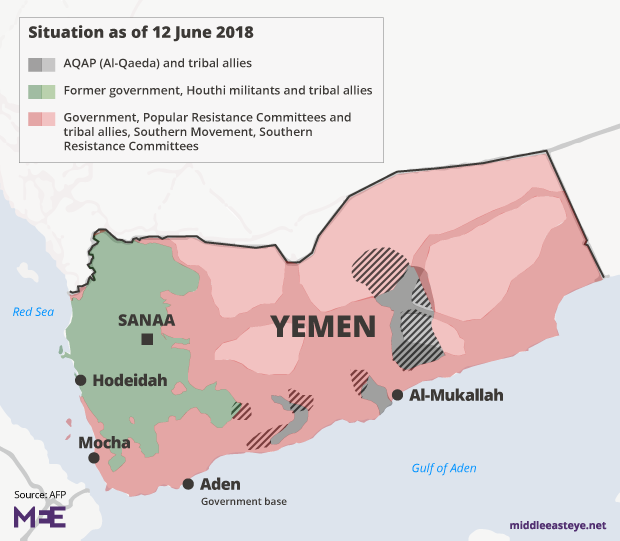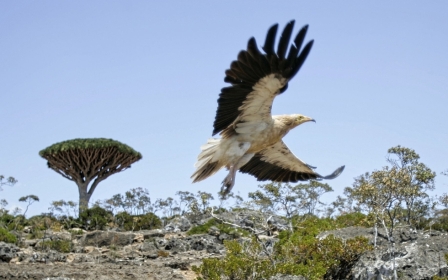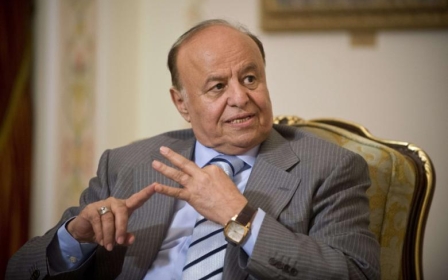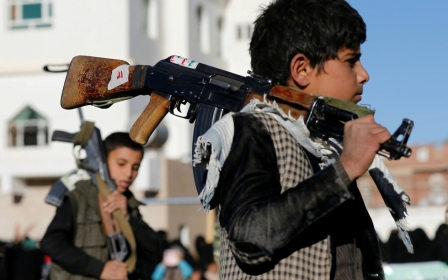EXCLUSIVE: UAE forced Hadi to support Hodeidah assault against his will

The UAE forced Yemen’s President Abd Rabbuh Mansour Hadi to announce his support for an Emirati-backed assault on the key port city of Hodeida against his will, a source told MEE, effectively sidelining the Yemeni leader.
Now, the well-informed Yemeni source said, Yemen’s Hodeidah runs the risk of becoming a city totally controlled by the UAE rather than the Yemeni state.
On Wednesday, Saudi- and Emirati-backed forces launched an operation to take Hodeida from the Houthi rebels, ostensibly on behalf of Hadi’s internationally recognised government.
According to the source, the president met with UAE Foreign Minister Abdullah bin Zayed on Monday in Saudi Arabia, at Riyadh’s request, in an attempt to secure Hadi’s support for the operation.
On Tuesday, Hadi flew to Abu Dhabi to meet Crown Prince Mohammed bin Zayed (MbZ), where the Yemeni president acquiesced to the Emirati demands.
The assault on Hodeidah began the next day.
“The UAE was trying initially to liberate Hodeidah without the support of Hadi and get the credit for it,” the source told Middle East Eye.
'The UAE was trying initially to liberate Hodeidah without the support of Hadi and get the credit for it'
- Well-informed Yemeni source
The source said control of Hodeidah’s port would be a great victory for the UAE, which has designs on controlling ports all along Yemen’s coast.
In recent years, the UAE has established a presence in several ports on the shores of the Horn of Africa, across the Bab al-Mandeb straight from Yemen, with a view to controlling the strategic waterways that lead up to the Suez Canal.
“They tried to get [the Yemeni island of] Socotra. Hodeidah would have been another port they could have controlled,” the source said.
Initially, the UAE sought Washington’s support for its assault.
However, such assurances were not forthcoming, and on Monday US Secretary of State Mike Pompeo issued a statement promoting a political solution to the conflict and warning that humanitarian aid must be free to flow.
As much of 80 percent of Yemen’s food, fuel, medicine and commercial supplies enters the country through Hodeidah.
“The UAE found they need the card of Hadi’s legitimacy. Hadi had no choice but to accept. His hands were forced.”
Soured relations
Relations between Hadi and the Emiratis, who entered the Yemeni war as part of a Saudi-led coalition fighting the Houthi rebels, have been strained.
The Yemeni president spends most of his time in Riyadh rather than Aden, which is ostensibly the seat of his government but is currently controlled by the Emiratis.
In February 2017, Hadi angrily confronted MbZ in Abu Dhabi, accusing the UAE of behaving like an occupier rather than liberator in Yemen.
Tensions grew further after a public spat over the UAE’s presence on Socotra, which Hadi’s government said was being colonised by the Gulf Arab country.
By giving the Emirati-backed assault on Hodeidah legitimacy, the source said, Hadi effectively handed the UAE future control of the city.
'What will happen next? Will Hodeida meet the same fate as Aden'
- Well-informed source
“What will happen next? Will Hodeida meet the same fate as Aden?” the source asked.
The source said it could spell the end of Hadi’s role as Yemeni leader, with the president relinquishing his position as Saudi Arabia and the UAE’s point man in the country to Tareq Saleh.
Saleh is leader of the ground forces attacking Hodeidah and is the nephew of former Yemeni President Ali Abdullah Saleh.
The Emirati and Saudi governments have been contacted for comment.
This article is available in French on Middle East Eye French edition.
New MEE newsletter: Jerusalem Dispatch
Sign up to get the latest insights and analysis on Israel-Palestine, alongside Turkey Unpacked and other MEE newsletters
Middle East Eye delivers independent and unrivalled coverage and analysis of the Middle East, North Africa and beyond. To learn more about republishing this content and the associated fees, please fill out this form. More about MEE can be found here.






